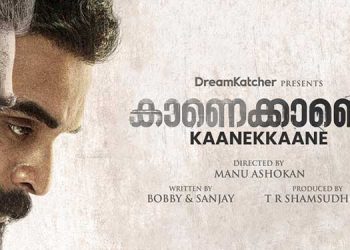Presenting itself as a thrilling ride through the barbs of indiscretions, over-thought judgements and misdirected insinuations, “Kaanekkaane” packs a punch with stellar performances by the likes of Suraj Venjaramoodu (Paul) and Tovino Thomas (Allen) and weaves a fitting tapestry of rushy human emotions. Is it too far-fetched for a human to not be impulsive and be suspended between what’s arguably right and wrong? Are emotions not to be trusted but whipped away at the whim of a moral code? Lapped with thorny sensations of overwhelming guilt, unnerving anger, and flashbacks to streaks of delayed discretions, “Kaanekkaane” ably ponders on whether it’s a crime to not do a particular thing at a particular time. The movie strikes many a shot, as it drifts through a tale of the raw emotionality of humans.
“Kaanekkaane” starts with Paul (Suraj) shovelling off dust from the epitaph of his daughter’s coffin and adorning it with freshly-brought roses. He then heads towards his son-in-law’s house and searchingly starts looking into it the moment he enters. Here’s a man, mildly smacking of desperation that’s seemingly taking a toll inside of him. As he moves about and asks for his grandson, he evinces a contained demeanour, with not much of a rush about things. He meets his grandson, teary-eyed, but doesn’t go for an overt sentimental trope and remains contained. Even with his being indulged in toys with him, he manages to not go overboard. On encountering his son-in-law, however, he tears off into saying ‘One entire year, Imagine!’; over not having been able to meet his grandson and him for an awfully long time. There are also these patchy renderings of ‘He doesn’t know how lucky he is’; as to point to life’s seemingly short spans of joy, and stretched planes of agony.

Every character seems to be infested with his or her own lapses; everywhere are shades of grey. A court battle is also in play in the background. Paul wants to do away with the proprietary formalities, thus rendering Kuttu (Master Alok Krishna) his mother’s heir. Also, Paul seems to be donned with light-seeming clothes, thus signalling to the purity and lightness of his being. The movie projects every situation with a certain unease, with cropped-up emotions of guilt and hate; and it seems to be defined by a certain realization of maybe, how lucky we are in general and how doom awaits us on a standby. The movie parallels the shots with flashbacks and pans to shrunk-up spaces, projecting antagonism in the air. Paul seems to have desperation embedded in him, as he walks off every situation with mixed emotions of guilt and hatred. He once renders to someone — recounting how his daughter Sherin was possibly left by his son-in-law to die on the road shoulder — in distress, how his son-in-law did away with her, ‘with no sense of guilt, with absolutely no sense of guilt’. Allen leaves his wife on the hard shoulder in hopes of not upending the chances of settling with Sneha. Here, you have a play of highly-contingent emotions, utterly lingering in suspension – a grave reference to the Shakespearean dictum, ‘To be, or not to be, that is the question’. With all this in retrospect, a stark sadness alights on Allen later in the film. Paul has this streak of severed eye-contact and doesn’t overtly let others in his roiling perceptivity. On meeting his son-in-law for yet another time, he says, engulfed with grief that, ‘You could have saved her!……And then gone off with whoever you wanted….I was still alive’.
The film also touches on the fostering role of a father; as the mother is not projected with as much solemnity and pomp’ how parents — in this case, fathers — are a relief in the face of flux-ridden treads of time, be it Sherin’s father, Sneha’s father, or Kutto’s father. Fatherly love plays out on the bench outside of school, when Allen is seen dialoguing with his son, and reinforces his love to him. Love is intimately played out, on various other levels of the film too; rendering it murky to categorize a character with either being good or evil. Tropes of relativity reign high here, with the film making it difficult to outright characterize someone. A pallid strangeness faces us as we move through the film; in that, every situation seems to be snowballed by Sherin’s death, which itself was a result of untended impulsion: and it’s its being human that makes things rather awry for us.
The film doesn’t grant us any moment of moral certitude. Even when it does, we are only assured of its haziness later on. A scene with Kutto squares it all when Paul impels him to go to his home on a vacation with an understated villainy. He spews reasons onto reasons to get him rather shoved away from his parents, and get settled with him instead. To this, Kutto moves from mellow to averse and vows never to see him again.
The movie has every character identifying with the story in a seemingly different way, but somehow still connected with Sherin’s death. A certain aversion and overt remoteness seems to engulf every character in this two-hour long thriller. On reaching Allen’s house — in hopes of sharing the audio recording of Allen succumbing to Paul’s pestering, on whether he left Sherin on the road that night — he again moves about the home, and is struck by Sneha’s epileptic lying on the floor as a result of her water breaking. Here’s a balancing act at its finest. Paul leaves her in pain, and then rushes again with a pronged conscience to the hospital. As he leaves on the bus with a realization of the timidity of life and the humanness of impulse at the back of his head, he churns a smile, as Sneha gives him a call.







